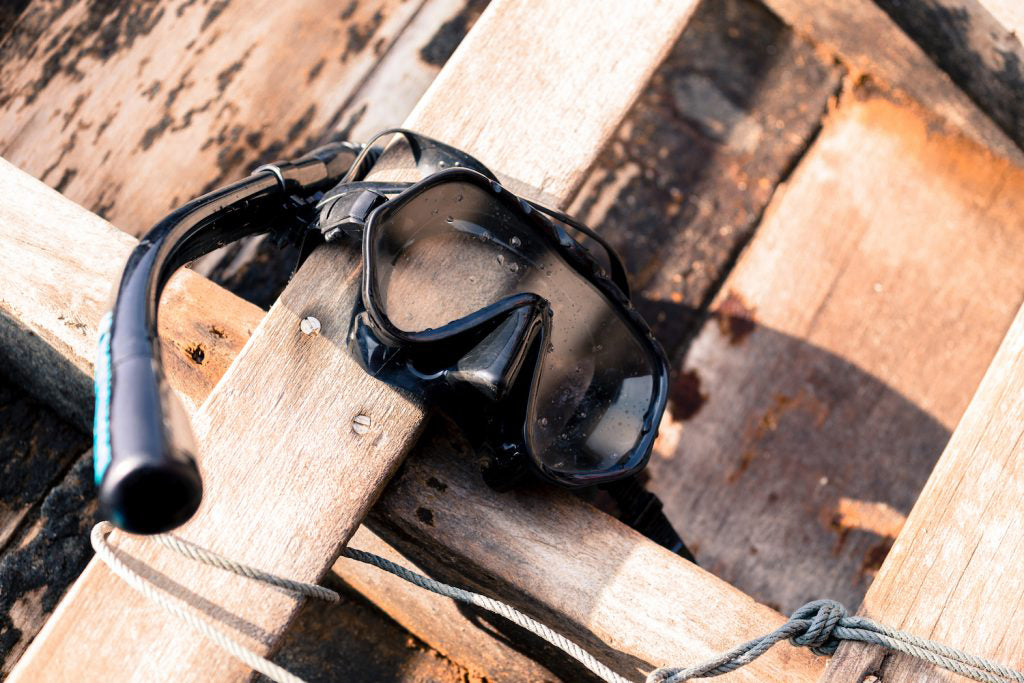
Some Tips For Preventing Mask Fog
All divers have experienced their masks fogging up. This problem is often just an annoyance, but can turn into a pretty big hinderance for having a fun, safe dive. Whether you’re a seasoned diver or someone new to the water, we hope these tips help you keep your visibility clear and your dive low-stress.
Pre-dive care
There are some steps you can take before you even get to the water to reduce mask fog. Cleaning your mask with non-whitening toothpaste is a great way to reduce fog, especially for brand new masks. There are specifically-made mask cleaning products on the market, but toothpaste is a good alternative. To do this, you can use either a soft-bristled toothbrush or your finger after you wash your hands. If you’re using your fingers, it’s important to wash them so that the oils from your hands don’t prevent you from cleaning the mask completely. Spread toothpaste on the lenses inside your mask and rub it in to cover the lenses completely. After that, wash your mask out while trying not to touch the glass too much. Test it by breathing into your mask and seeing how it holds up. You may have to repeat it once or twice, but this is one of the best ways to reduce mask fog long term.
Mask defoggers
The toothpaste treatment should help, but most divers still use some kind of anti-fog during their diving. Here are three of the most common options we see:
1、Defog products. There are tons of bottles of sprays and serums specifically marketed towards defogging snorkel and scuba masks. They all generally work the same way. You put in enough to coat your lenses, swish it around, then rinse it once in fresh or saltwater before putting it on for your dive. These products usually cost around $6-10 for a two ounce bottle, but a little goes a long way. The bottle should last you a long time, and sometimes one treatment will last you multiple dives without reapplication.
2、Baby shampoo. A cheap and popular alternative to defog products is to dilute a few drops of baby shampoo in water and pour it into a spray bottle. Then use it the same way as commercial defog: spray it, swish it, rinse it. This method is becoming more and more popular, but it’s important that you use baby shampoo. It’s gentle and biodegradable, and you don’t need much of it.
3、Spit. New divers might raise their eyebrows, but this is a common, effective, and free way to fight mask fog. In fact, many divers say that spit is more effective than anything you can buy, and you don’t risk realizing you forgot your defog bottle at home. Again, the process is the same. Apply, rinse, and wear it.
Habits
If you’ve pre-treated your mask, use a defogger, and are still having trouble with fogging, you might be able to change some of your habits to fix the problem.
1、Avoid touching the inside of your mask, especially right after you use defogger. Touching your mask transfers oils into it, negating the defogger effect and dirtying your mask. While many divers apply defog with their fingers, you can try to avoid that as well if you’re finding your mask still fogs after application. Use a defog that can easily swish around inside your mask rather than needing to be manually spread, and once it’s rinsed don’t put your hands back on it.
2、Don’t breathe out of your nose. It can take some time to adjust to solely breathing in and out through your mouth, but exhaling through your nose is a big cause of mask fog. Focus on how you’re breathing to see if this might be one of the problems you’re facing。
3、Make sure your mask fits properly. This can go hand in hand with the previous point. If your mask is flooding frequently, you’re going to have to breathe out your nose to clear it too often. Additionally, the moisture getting into your mask will promote the condensation that causes mask fog. In an ideal world, you would put the mask onto your dry face and that area would stay dry for the entire dive. In reality, there’s always going to be some amount of moisture getting in, but if you’re struggling with excessive mask fog you might want to try reducing the amount of water that comes in contact with your mask during the dive.
Have any anti-fog tips we missed? Let us and our readers know what worked for you in the comments!
Leave a comment
Comments will be approved before showing up.


